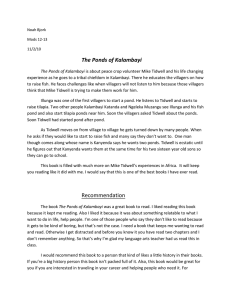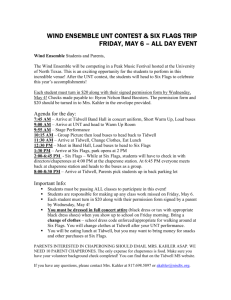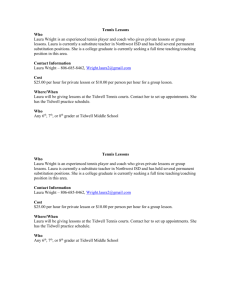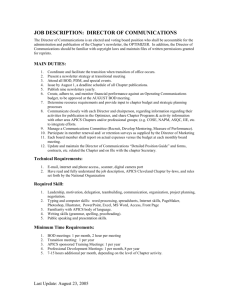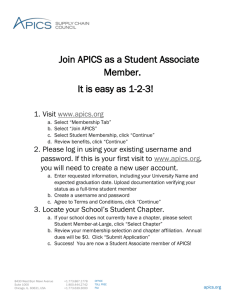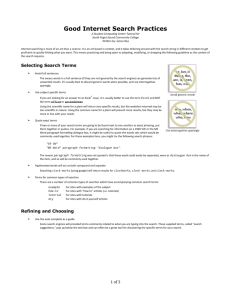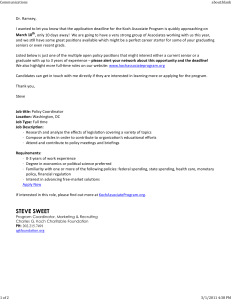CEO of WORLD electronics Names College of Business Lobby
advertisement
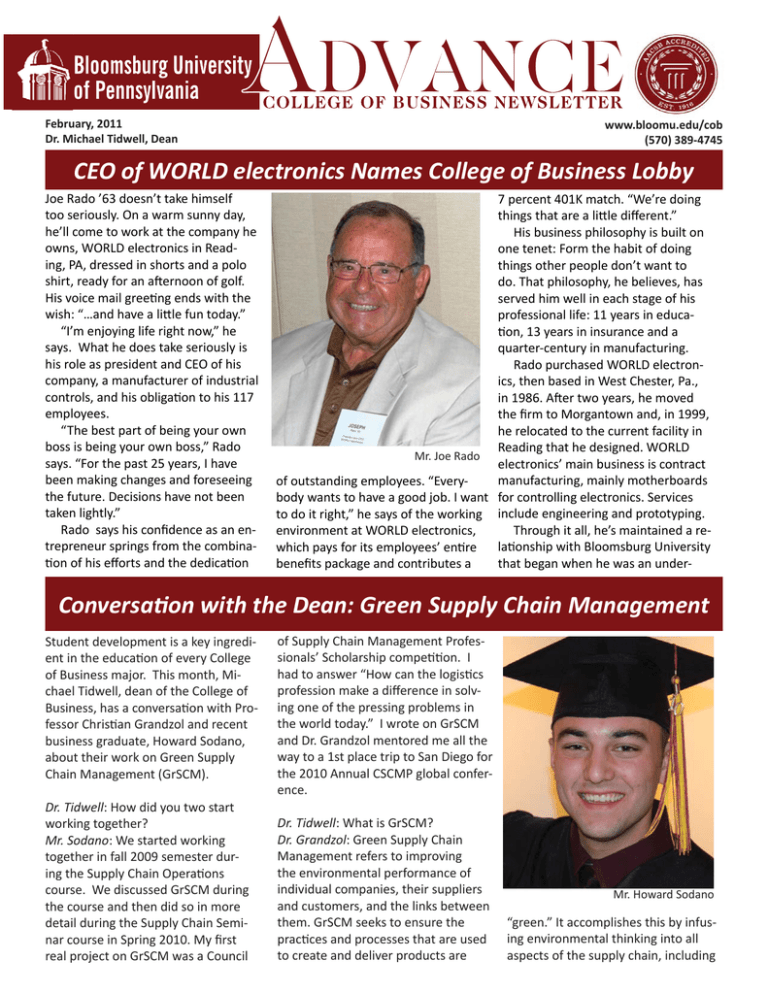
February, 2011 Dr. Michael Tidwell, Dean www.bloomu.edu/cob (570) 389-4745 CEO of WORLD electronics Names College of Business Lobby Joe Rado ’63 doesn’t take himself too seriously. On a warm sunny day, he’ll come to work at the company he owns, WORLD electronics in Reading, PA, dressed in shorts and a polo shirt, ready for an a ernoon of golf. His voice mail gree ng ends with the wish: “…and have a li le fun today.” “I’m enjoying life right now,” he says. What he does take seriously is his role as president and CEO of his company, a manufacturer of industrial controls, and his obliga on to his 117 employees. “The best part of being your own boss is being your own boss,” Rado says. “For the past 25 years, I have been making changes and foreseeing the future. Decisions have not been taken lightly.” Rado says his confidence as an entrepreneur springs from the combinaon of his efforts and the dedica on 7 percent 401K match. “We’re doing things that are a li le different.” His business philosophy is built on one tenet: Form the habit of doing things other people don’t want to do. That philosophy, he believes, has served him well in each stage of his professional life: 11 years in educaon, 13 years in insurance and a quarter-century in manufacturing. Rado purchased WORLD electronics, then based in West Chester, Pa., in 1986. A er two years, he moved the firm to Morgantown and, in 1999, he relocated to the current facility in Reading that he designed. WORLD Mr. Joe Rado electronics’ main business is contract manufacturing, mainly motherboards of outstanding employees. “Everybody wants to have a good job. I want for controlling electronics. Services to do it right,” he says of the working include engineering and prototyping. Through it all, he’s maintained a reenvironment at WORLD electronics, la onship with Bloomsburg University which pays for its employees’ en re that began when he was an underbenefits package and contributes a ConversaƟon with the Dean: Green Supply Chain Management Student development is a key ingredient in the educa on of every College of Business major. This month, Michael Tidwell, dean of the College of Business, has a conversa on with Professor Chris an Grandzol and recent business graduate, Howard Sodano, about their work on Green Supply Chain Management (GrSCM). Dr. Tidwell: How did you two start working together? Mr. Sodano: We started working together in fall 2009 semester during the Supply Chain Opera ons course. We discussed GrSCM during the course and then did so in more detail during the Supply Chain Seminar course in Spring 2010. My first real project on GrSCM was a Council of Supply Chain Management Professionals’ Scholarship compe on. I had to answer “How can the logis cs profession make a difference in solving one of the pressing problems in the world today.” I wrote on GrSCM and Dr. Grandzol mentored me all the way to a 1st place trip to San Diego for the 2010 Annual CSCMP global conference. Dr. Tidwell: What is GrSCM? Dr. Grandzol: Green Supply Chain Management refers to improving the environmental performance of individual companies, their suppliers and customers, and the links between them. GrSCM seeks to ensure the prac ces and processes that are used to create and deliver products are Mr. Howard Sodano “green.” It accomplishes this by infusing environmental thinking into all aspects of the supply chain, including Green Supply Chain Managment cont. from pg. 1 design, sourcing, manufacturing, packaging, distribu on, and end-of-life management. Dr. Tidwell: Why is GrSCM important? Dr. Grandzol: Supply chain is at the epicenter of the green movement because the ac vi es under the supply chain umbrella have a dispropor onate impact on the ecosystem and the direct ac vi es of any one company are generally a small por on of the overall chain’s impact. When a customer buys a product they also buy the prac ces and processes that made and delivered that product. These are where a majority of the environmental impacts are o en created, making it disingenuous to claim a product is “green” when the supply chain suppor ng it is not. It is widely reported that a majority of companies are underprepared when it comes to GrSCM and struggle to realize a posi ve ROI on their green projects. These companies need graduates who can help them focus on the essen al aspects of GrSCM and deliver quan fiable results. As an example, the GHG Protocol is the de facto standard for carbon repor ng. Un l now, repor ng on supply chain emissions (Scope 3) has been voluntary and few companies actually do it. Star ng in 2011, companies that use the GHG Protocol must report these Scope 3 emissions. Once that happens, more companies will be looking to make improvements along their chain and there will be increased incen ves to work with their supply chain partners. This is where our graduates will add value! Dr. Tidwell: What is the next step in your research? Mr. Sodano: Our research consisted of iden fying best prac ces in GrSCM and then performing a detailed audit of these prac ces at 5 local organiza ons. We recently presented our findings at an APICS Chapter meeting that was a ended by 20 business professionals from a variety of organiza ons and industries. The next step is to publicize our findings in order to increase awareness. We are currently in the process of preparing a paper that will hopefully be published in the Keystone Journal of Undergraduate Research. We also shared our work with a Junior SCM student who will be comple ng his Honors project on the same topic. The goal is for him to extend what we have done. NEPA chapter of APICS. It provided me with valuable public speaking experience and significant insight and feedback from some of the most respected professionals in the area. Dr. Tidwell: What is APICS? Dr. Grandzol: APICS (The Associa on for Opera ons Management) is an interna onal organiza on that has been providing corporate educa on, premier resources, and industry-leading creden aling since its founding in 1957. Tradi onally, APICS focused on produc on and inventory, but today its focus is on supply chain and operaons. APICS has over 43,000 members worldwide. Rado Lobby cont. from pg. 1 Dr. Tidwell: How will you implement your findings in a corpora on? Mr. Sodano: I am currently working for H.R.S. Transport in Phillipsburg, NJ and have been able to implement some of the best prac ces. For example, we are in the process of becoming an EPA SmartWay Transport partner. This entails aligning our commitment to green prac ces and processes with our supply chain partners. This will enable us to leverage GrSCM to collaborate with our customers and suppliers. Dr. Tidwell: What was the value of speaking to a group of industry professionals? Mr. Sodano: I was very lucky to have the opportunity to present to the Dr. Tidwell: What is the value of college students ge ng involved with professional socie es? Mr. Sodano: I would definitely recommend ge ng involved in professional socie es. Many professional groups provide an outlook that is different from the outlook provided by tradional student groups. They also help with job placement and networking. graduate and the student yearbook photographer. It con nues today as an alumnus and benefactor with his dona on of $250,000 to name the new lobby in Sutliff Hall, home of the College of Business. In recogni on of his generosity, the building will feature “Joe Rado Lobby” when renova ons are completed in August 2011. Rado says he supports BU as an opportunity to “give a li le back to the college. Professors were always firstclass and they teach you for what you are, not what they want you to be. They give you a chance … and some people need a second chance. “I like the way they do things. It’s the history, the culture, being friendly with no ulterior mo ves. For nearly 60 years, I could walk on that campus any me of day and be with friends.” Michael Tidwell, dean of the College of Business, says, “Joe’s gi is both generous and mely. He con nues to be a visionary business leader and great supporter of the College of Business. We are proud to honor his long me dedica on to Bloomsburg University with Joe Rado Lobby in our renovated Sutliff Hall.”
